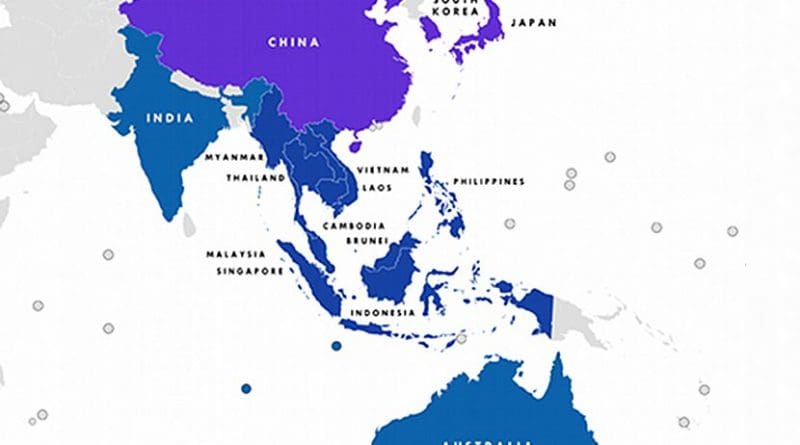Digitalization And RCEP To Boost Regional Economic Integration – OpEd
COVID-19 is undoubtedly a deadly disease that has disrupted our lives in many ways. As of Sept. 23, it has infected over 231 million people and killed more than 4.75 million people across the globe. It has also disrupted economic activities.
“The COVID-19 pandemic has disrupted global business across the world,” Steve Chen, Deputy Representative of Taipei Economic and Trade Office (TETO), said while opening an international webinar on Sept. 23 in Jakarta.
Surprisingly, the pandemic has also brought some positive changes.
“The ongoing pandemic also highlights the benefits of rapid technological progress, digitalization, and increasing services, trade, investments and providing new forms of global linkages,” the Center for Southeast Asian Studies (CSEAS), which organized a webinar titled “Economic Integration in ASEAN and East Asia: Trends and Prospects Post-COVID-19”, said in a press release.
Accelerated digital transformation can boost global output, trade and employment. App-based online companies, like Gojek, Grab and Shopee, in Indonesia have been empowering many small and medium scale enterprises and providing jobs to millions of people.
Almost all countries in Southeast Asia and East Asia are witnessing a robust, resilient, and sustainable economic recovery this year amid the pandemic.
“The pandemic so far did not disrupt the production system and trade patterns in the East Asian region,” said Aladdin Rillo, a senior economic advisor at the Economic Research Institute for ASEAN and East Asia, at the webinar.
Likewise, the agricultural sector was not disrupted by COVID-19 in many countries in Southeast Asia. However, we should also be realistic.
“The pandemic is not ending but peaking in Asia, although recovery is underway,” said Jayant Menon from the ISEAS-Yusof Ishak Institute in Singapore.
The recovery, Menon said, might be mixed and uncertain. Therefore, all countries must gradually open their borders and improve domestic mobility.
We really do not know the true nature of recovery and economic integration between Asia’s two dynamic regions in the post-COVID-19 period. Despite this, all countries must strive to boost their capacity building.
“The countries in East Asia and Southeast Asia are facing the same problem of limited economic capacity due to the pandemic. They must boost their capacity building in the post-COVID-19 period,” said Raldi Hendro Koestoer from the University of Indonesia, Depok.
During the webinar, Raldi spoke about a circular economy amid the pandemic. He said that it is vital for Indonesia.
“The implementation of a circular economy is expected to be one of the strategic policies and breakthroughs in rebuilding a more resilient Indonesia after the COVID-19 pandemic, with the creation of green jobs and through increased efficiency of resource utilization,” Indonesian Minister of National Development Planning Suharso Monoarfa said recently.
Asia’s regional integration, which began much before COVID-19, through improvements in infrastructure, connectivity, and movement of people, was badly affected last year, although not anymore.
“The trade is rebounding very fast,” Park Chin-young, director of Asian Development Bank, said.
“Asia is expected to maintain strong trade recovery post-pandemic, yet reconfiguration of global supply chains will pose challenges”.
This reconfiguration, Park said, would be based on regionalization, diversification and reshoring based on automation.
“Reshoring will be partial and limited. Mass market supply chains still face the pressure of diversification and relocation,” Roy Chun Lee, director of Taiwan’s The Economic Law Research Center, said.
The post-COVID-19 period will see regional integration differing from country to country and region to region.
“Asia’s regional integration continues to deepen, with varying degrees of integration across different dimensions and subregions,” Park, who is an expert on regional cooperation and integration, said.
According to Park, COVID-19 threatens to reverse progress attained by open trade, investment, and mobility but digitalization can help in recovery in the post-COVID-19 period.
Park also emphasized the important role of regional agreements, like the Regional Comprehensive Economic Partnership (RCEP) and the Comprehensive and Progressive Trans-Pacific Partnership (CPTPP), in regional integration.
“RCEP can further deepen regional integration. The signing of the RCEP has reenergised interest in Asia-Pacific cooperation,” Park said.
The RCEP was signed by 10 ASEAN countries, China, Japan, South Korea, Australia and New Zealand in 2020.
The CPTPP was signed in 2018 by Brunei Darussalam, Malaysia, Singapore, Vietnam, Japan, Australia, New Zealand, Canada, Chile, Peru and Mexico.
According to Roy, both China and Taiwan have applied to join the CPTPP recently.
The most interesting thing about the economic integration of ASEAN and East Asia in the post-COVID-19 period is Taiwan, the fourth largest economy in East Asia. What role will Taiwan play in the post-COVID-19 period?
“Taiwan can play an important role in promoting a green economy, digital transformation and regional economic integration between ASEAN and East Asia,” Arisman, executive director of the CSEAS and the moderator of the webinar, said.
Echoing a similar view, Roy said Taiwan is strong in digitalization, technology, small and medium enterprises and supply chains.
“Taiwan is ready to work with Southeast Asian countries in bringing quick and sustainable economic recovery in the post-COVID-19 period,” Roy said.
This year, economic recovery is imminent in many countries in Southeast Asia and East Asia. Trade and cross border investments will increase. Digital transformation, supply chain reforms, regional free trade agreements, reduction of non-tariff measures, capacity building, and micro, small and medium scale enterprises would be some of the main drivers of economic recovery and regional integration in the post-COVID-19 period.

